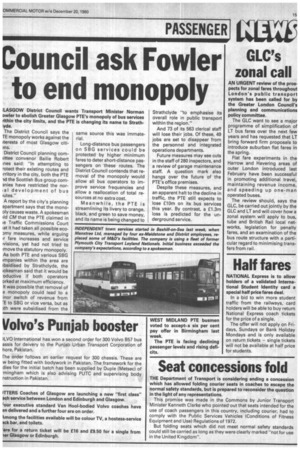Council ask Fowler to end monopoly
Page 17

If you've noticed an error in this article please click here to report it so we can fix it.
ILASGOW District Council wants Transport Minister Norman owler to abolish Greater Glasgow PTE's monopoly of bus services rithin the city limits, and the PTE is changing its name to Strathyde.
The District Council says the TE monopoly works against the iterests of most Glasgow citims.
District Council planning cornlittee convenor Bailie Robert Ines said: "In attempting to rotect their existing routes and Tritory in the city, both the PTE id the Scottish Bus group corn3nies have restricted the noral development of bus lutes."
A report by the city's planning apartment says that the monoply causes waste. A spokesman iId CM that the PTE claimed in le Traffic Commissions Court at it had taken all possible eco)my measures, while arguing afare increases and service visions, yet had not tried to -move the statutory monopoly. As both PTE and various SBG impanies within the area are ibsidised by Strathclyde, the lokesman said that it would be oductive if both operators orked-at maximum efficiency. It was possible that removal of e monopoly could lead to a inor switch of revenue from -E to SBG or vice versa, but as )th were subsidised from the
same source this was immaterial.
Long-distance bus passengers on SBG services could be protected by higher minimum fares to deter short-distance passengers on these routes. The District Council contends that removal of the monopoly would allow all bus operators to improve service frequencies and allow a reallocation of total resources at no extra cost.
Meanwhile, the PTE is streamlining its livery to orange, black, and green to save money, and its name is being changed to Strathclyde "to emphasise its overall role in public transport within the region."
And 73 of its 563 clerical staff will lose their jobs. Of these, 49 jobs are set to disappear from the personnel and integrated operations departments.
Future measures may see cuts in the staff of 280 inspectors, and a review of garage maintenance staff. A question mark also hangs over the future of the PTErs office premises.
Despite these measures, and an apparent halt to the decline in traffic, the PTE still expects to lose £10m on its bus services this year. By contrast, a £1.3m loss is predicted for the underground service.




















































































